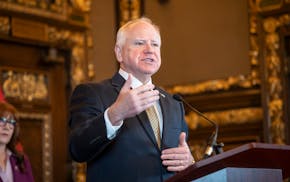Legislators got an earful when they asked constituents to voice concerns about the homeowners associations that govern 80% of new housing in the state, including one resident who described foreclosure proceedings started against them over a $56 trash fine.
"We've seen abuses, we've seen conflicts of interest, we've seen kickbacks, we've seen outright fraud," said Rep. Kristin Bahner, DFL-Maple Grove.
More than a million Minnesotans live in communities governed by private homeowners associations, and widespread complaints over how they wield their powers has led lawmakers to propose sweeping reforms meant to curb abuses of power.
But some HOA residents and property management companies want to slow down the proposed legislation that would reshape how the private communities are governed. Dozens of mostly individual board leaders rallied Wednesday afternoon at the Capitol in St. Paul to protest some aspects they consider overbearing, burdensome and problematic.
"As we all know, the road to hell is paved with good intentions," said Ron Klemz, an 80-year-old president of the Pine Hollow condominium community in Stillwater, speaking from a podium in the Capitol Rotunda on Wednesday. The legislation is "deeply flawed" and must not pass as presented, he said.
At issue is a package of bills moving through the House and Senate that promises to restrict how HOAs operate for the estimated 1.5 million Minnesotans who live in properties governed by HOAs.
Items on lawmakers' reform agenda include caps on fines and fees and restrictions on the ability to initiate foreclosure proceedings. Property management companies also could see a diminished ability to turn a profit through contract work in the communities they're hired to advise, in light of concerns around self-dealing and conflicts of interest.
Critics welcome some ideas for change, such as increased transparency. But board members take issue with the focus on egregious cases they say are not representative of the experience many have living in an HOA. And they believe board members who volunteer to lead associations are demonized because of the actions of a select few bad actors.
Companion bills in the House and Senate have so far seen bipartisan support. While a bitter, partisan divide delayed state government business at the outset of the legislative session in 2025, lawmakers from both sides of the aisle — and both chambers — are now displaying a cooperative spirit on the matter of HOAs and the remedies needed to fix the problems residents have aired.
The energy behind the move to impose more limits on the industry comes as HOA living has become more commonplace in Minnesota and around the country over the past few decades.
An HOA is essentially a quasi-local government where residents volunteer to be board members and oversee a designated community. Often the board hires a property management company to run day-to-day community needs like snow removal or lawn-mowing.
Minnesota ranked 15th in the nation in the total number of HOAs, with 8,000 associations and 624,000 units, according to a 2024 study by the Foundation for Community Association Research.
The growth in HOAs is fueled in part by practices of some city and county governments that effectively make the formation of those communities a condition of new development.
Last year state lawmakers established a working group with members from the DFL and Republican parties to hear from community stakeholders about the most pressing issues facing residents of HOAs. Over the course of 14 meetings and three community listening sessions, a final report completed in February identified more than three dozen recommendations.
Many homeowner associations are well-run and employ best practices that helped form the blueprint lawmakers modeled the reforms after, said Rep. Bahner, one of the authors and a leader of the work group formed last year.
Bahner said state laws regulating those communities have not kept pace with an explosion in growth — leaving officials to field a bevy of complaints about serious penalties for minor infractions. Meantime, the state has little ability to take action, she said.
In addition to the threat of foreclosure over a $56 trash fine, legislators heard that some associations skirted prohibitions on foreclosure actions during the COVID-19 pandemic, she said.
"There is no one who believes that taking a homeowner's home, their largest asset, for trivial reasons, like a $56 fine, is acceptable or appropriate," Bahner said.
State officials cannot put an exact number on how many complaints, fines or foreclosures tied to HOAs are out there, as there is no central repository collecting that data. Sen. Eric Lucero, R-St. Michael, said that while many HOAs are doing the right thing, he and other St. Paul lawmakers have heard time and again of serious abuses in some communities.
"For those bad apples, for those larger property management companies that are performing this exploitation and actively engage in conflicts of interest, that's who we're targeting," Lucero said.
Bahner and Lucero said lawmakers have been receptive to many of the concerns raised from the community, and the final bill will take into account suggestions made so far by concerned stakeholders. Both blamed some property management companies in Minnesota for ginning up opposition to the proposed bills.
"The property management companies are behind these efforts because they don't want reform," Lucero said. "They are benefiting from an imbalance of scales. They're benefiting by not having to ensure multiple bids, competitive bids, when performing roof jobs. They're benefiting when there's lack of transparency."
Both sponsors also said there are more complex issues to tackle in the years ahead — and the proposed bills making their way through both chambers of the Legislature represent first steps.
At the Capitol on Wednesday, several board members suggested lawmakers' focus is misplaced, encouraging them to pay greater attention to issues like rising fees attributed to increasing property insurance costs. Other concerns aired by the group include worries over dispute resolution that boards need to follow before fees can be levied against a noncompliant homeowner.
Klemz, an 80-year-old retiree and resident of a 51-unit condo community, said the board he oversees is all about building community with fellow residents. He said the community board works to be transparent and, while issues come up, members work together to resolve them.
"We're all in this together," Klemz said.

Delta hiked fares for solo travelers, until Twin Cities travel experts caught the change

In first speech back, UnitedHealth's new CEO pledges to review hot-button issues

A child had measles at Mall of America, concerning state health officials who don't know source

Ramstad: Gov. Walz, things are not getting done in Minnesota

